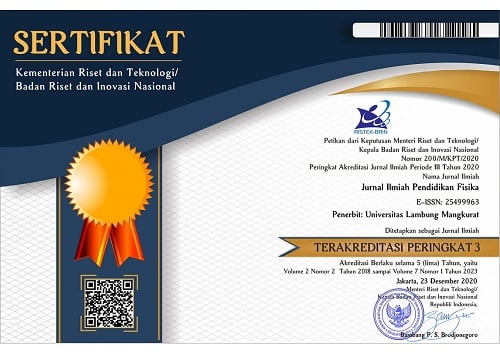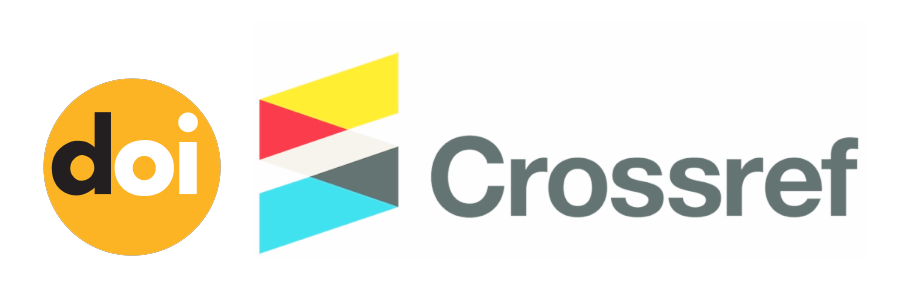The Effectiveness of Problem-Based Physics Learning to Improve High School Students' Science Process Skills
Abstract
This research aims to analyze the improvement in students' science process skills after applying the problem-based learning model to physics learning. Physics learning at the high school level, namely at Makassar National High School, experiences several deficiencies in the science process skills experienced by students. Choosing a problem-based learning model can support the delivery of material well. This research uses the problem-based learning model to analyze students' science process skills before and after being taught. The type of research used is quasi-experimental research. The population in this study was 32 students. The sampling technique uses purposive sampling with two classes. The level of science process skills of class X IPA 2 (experimental) students obtained an average score of 73.60 and class X IPA 3 (control) of 42.81. The results of the N-gain test analysis in the experimental class obtained an average value of 0.59 with medium criteria. The control class had an average N-gain value of 0.05 with low criteria, meaning there was an increase in both classes, so it can be concluded that there was a significant influence on students' science process skills after using the problem-based learning model, The research contribution is that the implementation of problem-based learning is very effective for improving physical science process skills.
Keywords
Full Text:
PDFReferences
Adri, M., Rusdinal, Zainul, R., Darni, Sriadhi, Wahyuningtyas, N., Khaerudin, Nasrun, Rahmulyani, Nuranjani, Nurmaniah, Wedi, A., Surahman, E., Aisyah, E. N., Oktaviani, H. I., Sri Martini Meilanie, R., Purnamawati, S. N., Hapidin, Listyasari, W. D., … Adnan, E. (2020). Development of content learning system in professional education subjects for educational institutions in indonesia. Journal of Physics: Conference Series, 1594(1). https://doi.org/10.1088/1742-6596/1594/1/012022
Ahriana, Yani, A., & Maruf, U. M. M. (2016). Studi analisis hubungan antara self efficacy dengan hasil. Jurnal Pendidikan Fisika, 4(2), 223–238.
http://journal.unismuh.ac.id/index.php/jpf/article/viewFile/312/293
Ali, M., Talib, C.-A., Hasniza Ibrahim, N., Surif, J., & Halim Abdullah, A. (2016). The importance of monitoring skills in physics problem solving. European Journal of Education Studies, 1(3), 1–10.
Ariansyah, Khaeruddin, & Maruf, U. M. M. (2017). Upaya meningkatkan hasil belajar fisika melalui pembelajaran kontekstual pada siswa kelas vii smp aisyiyah. Jurnal Pendidikan Fisika, 3, 91–104.
Ayyildiz, Y., & Tarhan, L. (2018). Problem-based learning in teaching chemistry: enthalpy changes in systems. Research in Science and Technological Education, 36(1), 35–54. https://doi.org/10.1080/02635143.2017.1366898
Bao, L., & Koenig, K. (2019). Physics education research for 21st century learning. Disciplinary and Interdisciplinary Science Education Research, 1(1), 1–12. https://doi.org/10.1186/s43031-019-0007-8
Cole, M., Cohen, C., Wilhelm, J., & Lindell, R. (2018). Spatial thinking in astronomy education research. Physical Review Physics Education Research, 14(1), 10139. https://doi.org/10.1103/PhysRevPhysEducRes.14.010139
Creswell, J. W. (2008). Educational research. Animal Genetics, 39(5).
Darmaji, Kurniawan, D. A., Astalini, Lumbantoruan, A., & Samosir, S. C. (2019). Mobile learning in higher education for the industrial revolution 4.0: Perception and response of physics practicum. International Journal of Interactive Mobile Technologies, 13(9), 4–20. https://doi.org/10.3991/ijim.v13i09.10948
Fidan, M., & Tuncel, M. (2019). Integrating augmented reality into problem based learning: The effects on learning achievement and attitude in physics education. Computers and Education, 142(July), 103635. https://doi.org/10.1016/j.compedu.2019.103635
Gall & Borg, Meredith D. Gall, Walter R. Borg, & Joyce P. Gall. (2003). Educational research_ an introduction (7th edition).
Hu, L., Chen, G., Li, P., & Huang, J. (2021). Multimedia effect in problem solving: a meta-analysis. In Educational Psychology Review (Vol. 33, Issue 4). Educational Psychology Review. https://doi.org/10.1007/s10648-021-09610-z
Husein, S., Gunawan, Harjono, A., & Wahyuni, S. (2019). Problem-based learning with interactive multimedia to improve students’ understanding of thermodynamic concepts. Journal of Physics: Conference Series, 1233(1). https://doi.org/10.1088/1742-6596/1233/1/012028
Ince, E. (2018). An overview of problem solving studies in physics education. Journal of Education and Learning, 7(4), 191–200. https://doi.org/10.5539/jel.v7n4p191
Ismail, N. S., Harun, J., Zakaria, M. A. Z. M., & Salleh, S. M. (2018). The effect of Mobile problem-based learning application DicScience PBL on students’ critical thinking. Thinking Skills and Creativity, 28, 177–195. https://doi.org/10.1016/j.tsc.2018.04.002
Janah, M. C., Antonius, T. W., & Kasmui, D. (2018). Pengaruh model problem based learning terhadap hasil belajar dan keterampilan proses sains. Jurnal Inovasi Pendidikan Kimia, 12(1), 2097–2107.
Malmia, W., Makatita, S. H., Lisaholit, S., Azwan, A., Magfirah, I., Tinggapi, H., & Umanailo, M. C. B. (2019). Problem-based learning as an effort to improve student learning outcomes. International Journal of Scientific and Technology Research, 8(9), 1140–1143.
Mann, L., Chang, R., Chandrasekaran, S., Coddington, A., Daniel, S., Cook, E., Crossin, E., Cosson, B., Turner, J., Mazzurco, A., Dohaney, J., O’Hanlon, T., Pickering, J., Walker, S., Maclean, F., & Smith, T. D. (2021). From problem-based learning to practice-based education: a framework for shaping future engineers. European Journal of Engineering Education, 46(1), 27–47. https://doi.org/10.1080/03043797.2019.1708867
Marisda, D. H., & Ma’Ruf, M. (2021). Situation analysis of mathematical physics learning with online learning during the COVID-19 pandemic. Journal of Physics: Conference Series, 1806(1), 2–7. https://doi.org/10.1088/1742-6596/1806/1/012034
Ma’Ruf, M., Handayani, Y., Marisda, D. H., & Riskawati, R. (2020a). The needs analysis of basic physics learning devices based on hybrid learning. Journal of Physics: Conference Series, 1422(1). https://doi.org/10.1088/1742-6596/1422/1/012029
Ma’Ruf, M., Handayani, Y., Marisda, D. H., & Riskawati, R. (2020b). The needs analysis of basic physics learning devices based on hybrid learning. Journal of Physics: Conference Series, 1422(1). https://doi.org/10.1088/1742-6596/1422/1/012029
Ma’Ruf, M., Handayani, Y., Marisda, D. H., & Riskawati, R. (2020c). The needs analysis of basic physics learning devices based on hybrid learning. Journal of Physics: Conference Series, 1422(1). https://doi.org/10.1088/1742-6596/1422/1/012029
Ma’Ruf, M., Marisda, D. H., & Handayani, Y. (2019a). The basic physical program based on education model online assisted by alfa media to increase creative thinking skills. Journal of Physics: Conference Series, 1157(3). https://doi.org/10.1088/1742-
/1157/3/032068
Ma’Ruf, M., Marisda, D. H., & Handayani, Y. (2019b). The basic physical program based on education model online assisted by alfa media to increase creative thinking skills. Journal of Physics: Conference Series, 1157(3). https://doi.org/10.1088/1742-6596/1157/3/032068
Ma’ruf, M., Setiawan, A., & Suhandi, A. (2019a). Identification of Android-based interactive multimedia needs for basic physics content. AIP Conference Proceedings, 2194(December). https://doi.org/10.1063/1.5139792
Ma’ruf, M., Setiawan, A., & Suhandi, A. (2019b). Identification of Android-based interactive multimedia needs for basic physics content. AIP Conference Proceedings, 2194(December). https://doi.org/10.1063/1.5139792
Ma’ruf, M., Setiawan, A., & Suhandi, A. (2019c). Identification of Android-based interactive multimedia needs for basic physics content. AIP Conference Proceedings, 2194. https://doi.org/10.1063/1.5139792
Ma’ruf, M., Setiawan, A., Suhandi, A., & Siahaan, P. (2020a). Identification of the ability to solve the problem of contextual physics possessed by prospective physics teachers related to basic physics content. Journal of Physics: Conference Series, 1521(2). https://doi.org/10.1088/1742-6596/1521/2/022011
Ma’ruf, M., Setiawan, A., Suhandi, A., & Siahaan, P. (2020b). Identification of the ability to solve the problem of contextual physics possessed by prospective physics teachers related to basic physics content. Journal of Physics: Conference Series, 1521(2). https://doi.org/10.1088/1742-6596/1521/2/022011
Ma’ruf, M., Setiawan, A., Suhandi, A., & Siahaan, P. (2020c). Identification of the ability to solve the problem of contextual physics possessed by prospective physics teachers related to basic physics content. Journal of Physics: Conference Series, 1521(2). https://doi.org/10.1088/1742-6596/1521/2/022011
Matthee, M., & Turpin, M. (2019). Teaching critical thinking, problem solving, and design thinking: Preparing IS students for the future. Journal of Information Systems Education, 30(4), 242–252.
Muktiarni, M., Widiaty, I., Abdullah, A. G., Ana, A., & Yulia, C. (2019). Digitalisation trend in education during industry 4.0. Journal of Physics: Conference Series, 1402(7), 0–6. https://doi.org/10.1088/1742-6596/1402/7/077070
Nuraisyah, Samad, A., & Maruf, U. M. M. (2015). Upaya meningkatkan hasil belajar fisika melalui model pemecahan masalah ( problem solving). Jurnal Pendidikan Fisika, 3(3), 270–278. http://journal.unismuh.ac.id/index.php/jpf/article/view/279/264
Pratiwi, S. N., Cari, C., Aminah, N. S., & Affandy, H. (2019). Problem-based learning with argumentation skills to improve students’ concept understanding. Journal of Physics: Conference Series, 1155(1). https://doi.org/10.1088/1742-6596/1155/1/012065
Raiyn, J., & Tilchin, O. (2015). Higher-order thinking development through adaptive problem-based learning. Journal of Education and Training Studies, 3(4), 93–100.
https://doi.org/10.11114/jets.v3i4.769
Rezki Rahman, M. (2023). Development of physics teaching material with problem-based learning to train students’ problem-solving skills. Jurnal Ilmiah Pendidikan Fisika, 7(3), 459–470. https://doi.org/10.20527/jipf.v7i3.9395
Ruf Ma’ruf, M. ’, & Dhiqfaini Sultan, A. (2023a). Analysis of the use of interactive multimedia android thermodynamics to reduce student misconceptions. European Online Journal of Natural and Social Sciences, 12(1), 213–219. www.european-science.com
Ruf Ma’ruf, M. ’, & Dhiqfaini Sultan, A. (2023b). Analysis of the use of interactive multimedia android thermodynamics to reduce student misconceptions. European Online Journal of Natural and Social Sciences, 12(1), 213–219. www.european-science.com
Rusanganwa, J. A. (2015). Developing a multimedia instrument for technical vocabulary learning: a case of EFL undergraduate physics education. Computer Assisted Language Learning, 28(2), 97–111. https://doi.org/10.1080/09588221.2013.784708
Sapna, H., Miriam, S., Hafiz Ridho, M., & Saukani, M. (2023). Improving students’ problem-solving skills using direct instruction-oriented worksheets on the subject of temperature and heat. Jurnal Ilmiah Pendidikan Fisika, 7(3), 391–399. https://doi.org/10.20527/jipf.v7i3.8988
Saputra, M. D., Joyoatmojo, S., Wardani, D. K., & Sangka, K. B. (2019). Developing critical-thinking skills through the collaboration of Jigsaw model with problem-based learning model. International Journal of Instruction, 12(1), 1077–1094. https://doi.org/10.29333/iji.2019.12169a
Savin-Baden, M. (2000). Problem-based learning in higher education: untold stories. Biochem. Mol. Biol. Educ. Biochemistry and Molecular Biology Education, 31(5), 454-. http://www.worldcat.org/oclc/425421421%5Cnhttp://www.worldcat.o
rg/oclc/423538701%5Cnhttp://www.worldcat.org/oclc/4656440090%
Cnhttp://www.worldcat.org/oclc/748996635
Suhirman, S., Prayogi, S., & Asy’ari, M. (2021). Problem-based learning with character-emphasis and naturalist intelligence: examining students critical thinking and curiosity. International Journal of Instruction, 14(2), 217–232. https://doi.org/10.29333/iji.2021.14213a
Sulaiman, F. (2010). Students’ perceptions of implementing problem-based learning in a physics course. Procedia - Social and Behavioral Sciences, 7(2), 355–362. https://doi.org/10.1016/j.sbspro.2010.10.048
Sulistyaningsih, D., & Sujarwanto, E. (2023). The effect of the 5e learning cycle model assisted by problem-solving-based student worksheets on student learning outcomes in the material of thermodynamics. Jurnal Ilmiah Pendidikan Fisika, 7(3), 522–531. https://doi.org/10.20527/jipf.v7i3.8386
Suliyanah, Deta, U. A., Kurniawan, F. K., Lestari, N. A., Yantidewi, M., Jauhariyah, M. N. R., & Prahani, B. K. (2021). Literature review on the use of educational physics games in improving learning outcomes. Journal of Physics: Conference Series, 1805(1). https://doi.org/10.1088/1742-6596/1805/1/012038
Temel, S. (2014). The effects of problem-based learning on pre-service teachers’ critical thinking dispositions and perceptions of problem-solving ability. South African Journal of Education, 34(1), 1–20. https://doi.org/10.15700/201412120936
Tsalapatas, H., De Carvalho, C. V., Heidmann, O., & Houstis, E. (2019). Active problem-based learning for engineering higher education. CSEDU 2019 - Proceedings of the 11th International Conference on Computer Supported Education, 2(Csedu), 347–351. https://doi.org/10.5220/0007720403470351
Williams, M. (2018). The missing curriculum in physics problem-solving education. Science and Education, 27(3–4), 299–319. https://doi.org/10.1007/s11191-018-9970-2
Wiranata, D., Widiana, I. W., & Bayu, G. W. (2021). The effectiveness of learning activities based on revised bloom taxonomy on problem-solving ability. Indonesian Journal Of Educational Research and Review, 4(2), 289. https://doi.org/10.23887/ijerr.v4i2.37370
DOI: https://doi.org/10.20527/jipf.v8i1.11544
Refbacks
- There are currently no refbacks.
Indexed by: Jurnal Ilmiah Pendidikan Fisika is licensed under a creative commons attribution-share alike 4.0 international license
Statistics Counter |
















